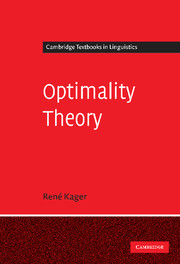Book contents
- Frontmatter
- Contents
- Preface
- 1 Conflicts in grammars
- 2 The typology of structural changes
- 3 Syllable structure and economy
- 4 Metrical structure and parallelism
- 5 Correspondence in reduplication
- 6 Output-to-output correspondence
- 7 Learning OT grammars
- 8 Extensions to syntax
- 9 Residual issues
- References
- Index of languages
- Index of subjects
- Index of constraints
9 - Residual issues
Published online by Cambridge University Press: 05 June 2012
- Frontmatter
- Contents
- Preface
- 1 Conflicts in grammars
- 2 The typology of structural changes
- 3 Syllable structure and economy
- 4 Metrical structure and parallelism
- 5 Correspondence in reduplication
- 6 Output-to-output correspondence
- 7 Learning OT grammars
- 8 Extensions to syntax
- 9 Residual issues
- References
- Index of languages
- Index of subjects
- Index of constraints
Summary
Introduction
The previous eight chapters of this book have offered an overview of Optimality Theory, with an emphasis on areas in which the theory has proved successful. This chapter will add an overview of issues that have not yet been successfully resolved, and developments and modifications in the theory that are currently taking place. The issue that is perhaps most urgently in need of a solution is opacity, to be discussed in section 9.2. Remaining sections each deal with a major theme in ongoing research. First, absolute ungrammaticality will be addressed in section 9.3. Section 9.4 will evaluate strategies to deal with optionality and free variation. Next, section 9.5 will discuss positional faithfulness in relation to functional approaches to phonology. Finally, section 9.6 will re-evaluate the role of underlying forms in OT, linking this issue with phonologically driven allomorphy. Conclusions and a perspective on future developments in OT will be presented in section 9.7.
Opacity
Introduction
Opacity refers to the phenomenon that output forms are shaped by generalizations that are not surface-true. Opaque generalizations lurk at a level deeper than the output, which becomes apparent by ‘peeling off’ effects overlaid by other surface-true generalizations. Opacity is predicted by any theory allowing non-surface levels of description (the input, or any level mediating between input and output). However, opacity presents a potential problem for surface-oriented OT, a theory disallowing reference to preoutput levels by well-formedness constraints.
- Type
- Chapter
- Information
- Optimality Theory , pp. 372 - 424Publisher: Cambridge University PressPrint publication year: 1999

